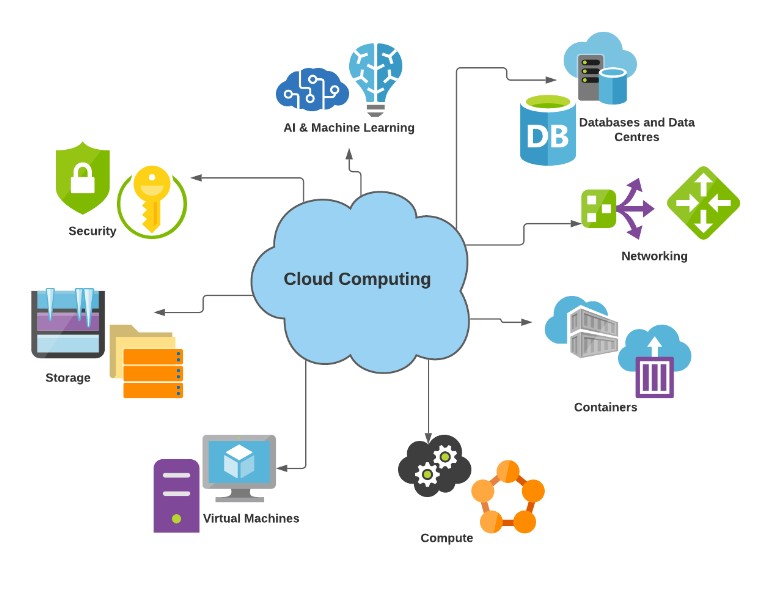Cloud computing has revolutionized the way businesses operate by providing access to a wide range of powerful tools and services through the internet. This technology has rapidly grown in popularity, with more and more companies embracing it as a means to streamline their processes, reduce costs, and improve efficiency. As we look towards the future, it is clear that cloud computing will continue to play a major role in shaping the business landscape.
Trends and Insights
Increased Use of Artificial Intelligence and Machine Learning
One of the most significant trends we can expect to see in the future of cloud computing is the increased use of artificial intelligence (AI) and machine learning (ML). These technologies are already being integrated into various aspects of cloud computing, such as data processing and analysis, predictive analytics, and even customer service. As AI and ML continue to evolve, we can expect them to become even more integrated into cloud computing services, providing businesses with more advanced capabilities and insights.
Multi-Cloud Environments
Another trend that is gaining traction in the world of cloud computing is the use of multi-cloud environments. This involves utilizing multiple cloud service providers to meet different business needs. For example, a company may use one provider for data storage and another for infrastructure management. This approach offers several benefits, including increased flexibility, improved performance, and reduced risk of downtime.
Edge Computing
With the rise of Internet of Things (IoT) devices and the need for real-time data analysis, edge computing has become increasingly important. This involves processing and analyzing data at the edge of the network, rather than sending it to a centralized cloud environment. As more businesses adopt IoT devices and require fast data analysis, we can expect to see a greater emphasis on edge computing in the future.
Increased Security Concerns
As businesses become more reliant on cloud computing, security concerns will continue to be a major issue. With more data being stored and processed in the cloud, companies must ensure that their sensitive information is secure and protected from cyber threats. This will lead to an increased focus on implementing robust security measures and regularly updating them to stay ahead of potential risks.
Serverless Computing
Serverless computing has gained popularity in recent years, offering businesses a cost-effective and scalable solution for handling their workloads. This approach involves running applications without the need for dedicated servers, allowing businesses to focus on development rather than infrastructure management. As more companies adopt this model, we can expect to see it become even more prevalent in the future of cloud computing.
Hybrid Cloud Models
A rising trend that is set to shape the future of cloud computing is the adoption of hybrid cloud models. This model combines the use of public and private cloud solutions, enabling businesses to leverage the best of both worlds. Public clouds offer cost-effectiveness and unlimited scalability, while private clouds offer enhanced security and control. By utilizing a hybrid approach, businesses can optimize their operations by choosing where to host their applications and data based on their specific needs and circumstances.
Quantum Computing
The advent of quantum computing is poised to spark a revolution in cloud computing. Quantum computers, with their ability to perform complex calculations at speeds unimaginable with traditional computers, offer immense potential for cloud computing. Although still in its infancy, the integration of quantum computing in the cloud could drastically enhance data processing and computational capabilities, paving the way for groundbreaking advancements in fields such as artificial intelligence, cryptography, and complex modeling.
Sustainability in Cloud Computing
As businesses and consumers become more aware of their environmental impact, sustainability in cloud computing is becoming increasingly important. Cloud providers are investing in renewable energy sources and more efficient cooling methods to reduce their carbon footprint. In the future, we can expect to see a greater emphasis on environmentally-friendly practices in cloud computing, including energy-efficient data centers, ‘green’ cloud solutions, and sustainable policies.
Conclusion
In summary, the future of cloud computing holds many exciting developments and advancements that will continue to shape the way businesses operate. With the continued evolution of technologies such as AI, ML, and quantum computing, along with the adoption of innovative approaches like hybrid and serverless models, we can expect to see increased efficiency, flexibility, and security in cloud computing. As businesses continue to embrace the benefits of the cloud, staying up-to-date with these trends will be crucial for their success in the ever-changing business landscape. So, it is important for companies to constantly evaluate and adapt their approach to cloud computing in order to stay ahead of the curve and maximize their potential.
To read more articles visit XYZ Webtoons
